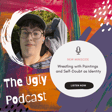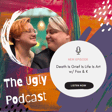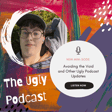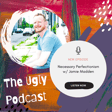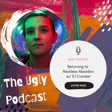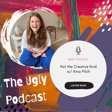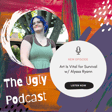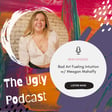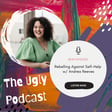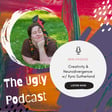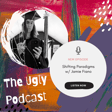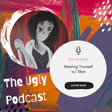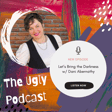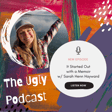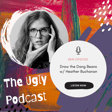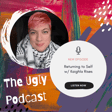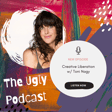Introduction to the Ugly Podcast
00:00:03
Speaker
Welcome to the Ugly Podcast. I'm your host, Lauren Alexander, she, they, and this is the place where creatives are encouraged to make messy, ugly art and let go of perfectionism.
00:00:14
Speaker
I started this podcast with my creative partner, Emerson, and we've since grown into our businesses. And this podcast is now evolving into a space where I interview other creatives to discuss our creative processes and how we navigate the mental mind field of creativity. This podcast serves as a reminder that you and your art get to be whatever the hell you want to be, ugly and all.
00:00:40
Speaker
Hello and welcome back to the Ugly Podcast. Thank you so much for being here again. I'm just over the moon about my guest today. I have been trying to get her on this podcast for months and it finally is happening and I'm stoked.
Meet the Guest: Gowry Yadi
00:00:58
Speaker
Um, so without further ado, my guest is a writer and multiple, wow, can't say that word, multidisciplinary creative naturopath and creative, creative wellbeing coach. She creates resources like eBooks classes and coaching programs for tired and burnt out creatives to regain the energy to make their incredible art through holistic nervous system care. She has recently released a free book and audio book called a creatives guide to burnout, which is available now.
00:01:27
Speaker
And if you wouldn't mind saying your first and last name and your pronouns for us, welcome to my cast. No worries. Um, my name is Gary Yadi and my pronouns are she and her. Welcome, Gary. I'm so glad you're here. So glad to be here. Thank you for having me. Thank you for not, uh, getting annoyed with me every time I check in with you, like, Hey, still thinking about it. I love it. I love it. Have the worst memory. So having someone else check in is amazing.
00:01:57
Speaker
I do too. I have a terrible memory, and so whenever I can offer that, I do. I'm like, I will set an alarm and I won't remind you because I know that I forget everything. I'm so, so glad you're here. And this is actually a very good timing for this, so it really just works out.
00:02:16
Speaker
timing is incredible when like things just kind of come together like this because I am going on vacation at the end of this month and part of me was like oh god I need to like get everything ready before my vacation I have to have all these posts scheduled to go out I have to get this podcast finished and released to go out while I'm away and hope there's no technical difficulties and then I was like wait a second
Releasing Perfectionism and Embracing Rest
00:02:40
Speaker
I don't have to do any of that. I can just go on my vacation and rest and release a new podcast when I get back.
00:02:49
Speaker
So this episode will be coming out after my vacation at the end of the month. And I will be very well rested after that, I hope. I love that so much. And that's so the corporate approach to going on vacation, isn't it? Because I don't know about you, but as someone who also works a day job, I notice that when I'm going on vacation, everything just intensifies to the point where I get so tired that when it comes around to the vacation, I'm actually like, I just want to lie in bed forever.
00:03:18
Speaker
And I don't want to do any of the things that I planned or that I was looking forward to. Right. Yes, exactly. You're just burnt out and ready for vacation from your vacation, as they say.
The Productivity-Worth Paradigm and Burnout
00:03:33
Speaker
So I want to ask this very oversimplified and heavily generalized question right at the top, which is why don't we know how to rest?
00:03:42
Speaker
And why is it so just, it's the natural course of action to just keep going, keep going, keep going until burnout. And we just don't understand how to rest. Why don't we know that?
00:03:54
Speaker
Yeah, I know. It's such a huge question, and it's such an important question. I want to pick up on something that you said there, which was that we naturally go until we burn out. I don't think we do that naturally. Yeah, naturally. You were there. Yeah. Not at all natural. I think that we're programmed and conditioned to do that in a society that is a capitalist society, where productivity and worth are interlinked.
00:04:23
Speaker
And the only way to be a worthy member of society is to just go, go, go, go and produce value, whatever that means, until you've got nothing left to give. And then you can just burn out and feel awful because you're no longer productive. And so therefore maybe you're no longer worthy. And we're not really taught the skill of rest.
00:04:46
Speaker
Like, you know, as kids, we know how to rest, we know how to play, we know how to have fun. And as soon as schooling starts, those rest blocks become very controlled. It's like you rest at morning recess, you rest at lunch, you rest maybe after school. And then those blocks of rest get smaller and smaller and smaller, and more and more focus is put on producing, learning,
00:05:12
Speaker
you know, I guess sublimating your body's desires and wants for eight hours a day. And we just go on like that. And nobody talks about rest anymore, except in the context of vacation and travel where you vacate your life. And then you have this like other life for a couple of weeks. And then you come back, back to the conditions that burn you out and you do it all again.
00:05:38
Speaker
So it's not really encouraged. In other words, it's not really encouraged in our society at all. It's not. And I think it's so interesting how you mentioned that phenomenon where it keeps getting smaller and smaller as we get older. It's like, oh no, you're a grown up now. You don't need to rest. You've grown out of that, which is such a silly thing.
00:05:59
Speaker
Yeah. We don't, we don't really grow out of it. I mean, yes, to a certain degree, maybe we do need less, but we still need it. And it's not just sleep either. Like sleep is absolutely important. And we need that sleep to keep us going, but we also need waking rest.
Impact of Technology on Rest
00:06:18
Speaker
We need play and we need joy. And a lot of us are not getting that because we don't think we're allowed it and we don't think we deserve it.
00:06:27
Speaker
Yes. A hundred percent. And I think it's also like we forget what is actually restful, especially like I will find my brain kind of going into like a toddler mode where they're like really, really tired and they really need a nap, but they do not want to sleep. And I feel like that's kind of what my brain does when it's like, okay, I need to rest. I like.
00:06:52
Speaker
I don't need to do anything right now. And yet my hand is still itching for my phone to scroll, scroll, scroll, or binge watch a show. I still need something in front of me. And my brain's like, no, I still need stimuli. And it's like my brain's having a tantrum. And I'm like, no, you need.
00:07:09
Speaker
nothing happening. You need to presence you need. But it's so funny how our brains get that like attachment to dopamine and it, it becomes very hard to then rest or train yourself to rest and get out of that habit.
00:07:28
Speaker
And that overstimulation is something that's very much encouraged, isn't it? So everything, like you said, everything that we interact with in our downtime, things like social media, even streaming television, things like that, they're all designed to spike that dopamine and to make you want more and more and more. So that's become our new normal. Our brains just expect to be constantly stimulated.
00:07:51
Speaker
And so sometimes when you're starting to incorporate more rest for the first time, it can be useful to lean on things that do vacate you from the present moment. So things like watching a show or reading a book, things that take you away from your current reality and give you stimulus, give your brain some stimulation.
00:08:12
Speaker
And then sometimes that can allow you to gently move into things that are a bit more restful and a bit less stimulating over time. But sometimes if you go from, you know, incredible stimulation, scrolling on Instagram all the time to then just trying to stop that and trying to do presence meditation, things like that, the, I guess the differential between the two is too big. So.
00:08:39
Speaker
It can, it can be awful. It can feel really terrible. Rest can feel absolutely awful. Um, if you're not clever about how you ease into it. That's so interesting. Like, so you're talking about kind of using those things as tools to ease into rest, not as rest itself. Exactly. And I'm not saying, I'm not saying that they can't be rest.
00:09:03
Speaker
You know, sometimes reading a great book or watching a wonderful TV show can be incredibly restful. But if you're doing it in a binging way to a point where it's no longer enjoyable, then I would say it's not restful. Whether something is restful or not depends on how it feels in your body. So if you feel yourself relaxing,
00:09:25
Speaker
Yes, it's restful. If you feel yourself kind of becoming overstimulated or just not having a very good time, it's probably not restful. So like when I'm rewatching,
00:09:39
Speaker
30 Rock for the fifth time. And I'm just like scrolling on my phone while I'm watching the show. That's probably not very restful. Probably not. It could be very enjoyable, but it's probably not restful. Yeah. I love that. OK, I want to shift the focus onto you a bit. So what was your relationship to creativity like when you were younger and how has it evolved throughout your life?
Gowry's Creative Journey and Burnout Experience
00:10:04
Speaker
Hmm. So I'm really fortunate in that my writing was always encouraged. So my mum is also a writer and so she recognized my interest and she recognized my ability from an early age and she nurtured that. So I'm very lucky in that respect.
00:10:20
Speaker
And similarly, I went to a very academically focused school, but they did still recognize that I had a talent for fiction writing. And that was encouraged as well. It was encouraged in a weird way in the sense of, oh, you should enter your working competitions. So it was very much like an academically kind of driven way of encouraging, but it was still encouragement.
00:10:43
Speaker
But I've been looking back at all of the other things that I used to enjoy doing that are also creative, so things like making music and singing and visual art and things like that, where I'm not probably as naturally, I guess, talented, if you want to use the word talented, I don't love that word, but not as naturally talented at those things. Those weren't encouraged as much.
00:11:08
Speaker
And so I ended up, as I got older, I ended up narrowing my focus down to writing, even though I had all of these peripheral interests. And it wasn't until very recently that I decided, hey, I actually don't want to make a living out of my writing exclusively.
00:11:28
Speaker
So why am I treating it like a job? Why am I going for the thing that I'm the most skilled at that I'm most likely to be able to make money from to the exclusion of all the other things that I'm still interested in? So I've recently gone through a bit of, I guess, an opening up of the possibilities around
00:11:47
Speaker
what creativity means for me and that's been so amazing because the way that I used to as a teenager create was I'd see something cool in an art form that I wanted to experiment with and I would just go do that. So one example is in the 90s there was this fantastically bizarre
00:12:07
Speaker
webcomic called Pokey the Penguin. I don't know if you've ever heard of it. It was very weird. Yeah, extremely weird. The art was really bad. It was like it was done in paint and the penguin character was just
00:12:21
Speaker
like the image of the penguin was just copied every time like and maybe the image was flipped but it was just not like the production values were low and I thought it was hilarious and lots of people knew about it at that time and thought it was funny so myself and the person I was dating at the time we were like let's make our own and so we made this whole webcomic
00:12:40
Speaker
And it was the most fun and it was bad and we loved it. And so I just remember that and I think, why am I not doing that kind of thing now? So I've recently taken up the violin, which I'm not good at, but I love it. And I started making vlogs and just doing like things that aren't writing. And yes, I'm still writing, but just opening up what's possible for me creatively.
00:13:07
Speaker
Oh, that makes me so happy to hear. I don't know how much you know about my ugly art lifestyle now. But it is, it's so for me, it was a very similar thing, not so much with like the writing being encouraged, but really, like all of my creativity was kind of
00:13:25
Speaker
just like, well, you're not the best at that. So let's focus you where you are. Good. And so I just didn't do anything creative for so long. And now I'm trying to open myself up to all kinds of art. And the way that I'm able to do that as such a perfectionistic person is by saying, I'm just going to go make a bunch of ugly shit.
00:13:45
Speaker
And I do. And it's so enjoyable. Like you said, like the little web cartoon, like just scribbling on pages and making silly weird faces and trying to come up with the most random thing I possibly can to like have them in a little dialogue bubble. It's just it's so fun. And when we can actually embrace those things that we're not necessarily good at, but that we just have a lot of fun and can play with, it's just
00:14:12
Speaker
It's just so good and I love it. So I'm so happy to hear that that's the road you're going down. Oh, that's awesome. I love that for you as well.
00:14:21
Speaker
I really think that creativity was really made for us to just enjoy and entertain ourselves with. And it's become like it's got funneled into capitalism. So now it's like suddenly we have to make money out of it. And it's like, that's fine. That's great. If you want to do that, awesome. More power to you. But that's not the only way. Like we can just make stuff to delight ourselves and our friends. And that's enough. Yeah, exactly.
00:14:47
Speaker
We have this idea that everything we do has to be good or have value. This belief leads us to burn out. It can hold us back from creating altogether. But in my Ugly Art 101 course, I break down these restrictive beliefs and lead you through exercises that intentionally subvert perfectionism and bring playfulness back into your creative process. You can get the first day absolutely free by going to my website, scribeandsunshine.com and signing up on the homepage. Join me in my weird ugly art revolution. Back to the show.
00:15:20
Speaker
Okay, so now tell me about your burnout experience then. And then what subsequently drew you into this work? Yeah. So it's a big story and I'm trying to think of where to start. I guess. However much or as little as you want to share. Awesome. Love it. Okay.
00:15:43
Speaker
So I guess I took a detour from creativity. So when I left school, I went to university, I did a creative writing degree and I was like, okay, my plan now is to work in publishing and, you know, wait for my big break as a writer, whatever that means, whatever I thought that meant at age 23 or whatever. Um, but I ended up getting really ill for about six months, not, I wasn't burnt out. It was a.
00:16:10
Speaker
physical illness and I suddenly became really interested in health. So then my brain was like, yeah, let's do a whole second degree and let's do it in something health related. So I went off and did that and I became a naturopath, which was amazing. And I was like, great, I'm going to be a naturopath and I'm going to write books on the side. It's going to be amazing. However, during the six years that I spent studying to be a naturopath, I basically didn't write a word because I was so
00:16:41
Speaker
I guess enveloped by everything that I had to do to study and I was also working on the side. So there wasn't much space for my creativity.
00:16:50
Speaker
When I graduated, I was like, yes, now that I have control over my schedule, I'm gonna have my own business as a naturopath, I'm gonna write now. Did not, did not. Running your own business, running your own clinical practice is so overwhelming, because you're all of your staff, and you're also the person who delivers the service. So I was not writing, not creating in any way, spending all of my energy, keeping my business running,
00:17:19
Speaker
I loved it though. I loved helping clients. I was seeing a lot of clients with stress and fatigue and stress related conditions. And it was such a gift to be able to teach them about their bodies and see them flourish with their own efforts. Like it was beautiful. But in the meantime, I was not taking care of myself because I was doing 12 hour days on my business. Yeah.
00:17:44
Speaker
Yeah. Trying to keep everything afloat. Yeah. And so by the end of four years, I just, I just was like, I actually can't do this anymore. I can't run myself into the ground while helping other people. And I burnt out and I had to close my practice in 2017. I had nothing left, no energy, nothing in the tank. I spent most of 2017 in front of the television, to be quite honest.
00:18:14
Speaker
because I couldn't do anything. I was exhausted and I was probably also depressed now looking back at it. Did I write anything? No. Did I create anything? No. And it wasn't until the end of the year nearly
00:18:32
Speaker
When I stopped and thought, hold on, am I burnt out? It's hilarious because I'm qualified in healthcare and I hadn't considered. I didn't have the room to consider, am I burnt out? Do I need to be helping myself? Yes, I probably do.
00:18:52
Speaker
The next couple of years was just a slow easing out of that space of burnout. And it involved, you know, coming back to my spirituality, coming back to taking care of my body, coming back to all of the healthy habits that I'd spent the last four years helping other people build, and systematically dropping from my own life.
00:19:16
Speaker
And within sort of a year, maybe year and a half, I noticed that I started creating again. And that was the moment where I was like, oh, there's something here. And there's probably lots of people who are like me who are in it and don't know they're in it or they're in it and they don't know what to do to get out of it. And that's kind of what drew me to the whole creative burnout area.
00:19:44
Speaker
I it's so good. I I love just how sometimes our lives can go down these strange paths and then all of our I mean with you it was.
00:19:56
Speaker
like your experience with health and natural path. And then you're like able to use that now, even though you're not necessarily doing the same things, but you're able to take all of that knowledge that you gained and now transform it into this new thing that's going to help other people. And it's just, it's so cool how that happens in our lives. And so I'm very glad that you found this exciting new purpose.
00:20:21
Speaker
Thank you. I'm so glad that it was for something, going through the burnout, and also going through those intense years of study and clinical practice. It was all for something, and something is unfolding now. And I love that, because when I was in it, I was like, I don't know what any of this is for. I don't know what the lesson is here. I'm just putting one foot in front of the other and trying to survive. Yeah, so true. I am curious, like, so...
00:20:51
Speaker
What was the draw to specifically looking at creative burnout versus like burnout for entrepreneurs? And I know it's very similar, especially because so much entrepreneurship is like focus. I mean, because you're the sole person, so much of it is creativity of generating new content and marketing and all of this. So I'm curious, what made you tilt towards creativity specifically? So I think
00:21:19
Speaker
It was partly because creativity is such an integral part of my experience and what I want to do in the world. And I spent so many years just not connecting with it. And I just think of what I could have done if I'd been more connected to it. And so I just think of people who are burnt out right now and they have all of this art inside of them and all of this potential for creativity.
00:21:48
Speaker
there's no energy and there's no drive and there's nothing, they can't get it out. And I just think that art is so important. You know, like people talk about it as though it's a luxury or it's just entertainment or whatever. But if you think about the pandemic, how many people got through by watching television, listening to music, listening to podcasts, reading books,
00:22:14
Speaker
beautifying their spaces with visual art. We need art. We need art to survive and we need art desperately through tough times. And there are so many people out there right now who are struggling outside of the pandemic who need art to lift them up and to get them through. And I hate the idea that we could be losing out on so much art and maybe even some of the greatest art of our time because artists are burnt out
00:22:43
Speaker
And they're not supported and they're not making the art that they feel called to make and that they could be making. And that makes me feel sick. Yeah, it does. Yeah. And especially because so many people do art on the side of their job, their full-time job. And so when you're burnt out on your full-time job, it's very hard, like you said, to then go outside of your job and pick up a paintbrush, pick up a pen, like,
00:23:10
Speaker
you don't want to continue doing creative things because you're already so tired from your full-on job. As I'm talking, I'm just like, capitalism sucks. Oh, it sucks so much, doesn't it? And we can't opt out. We can't just be like, I'm not going to be a capitalist. Thank you. It's like we're in the system. I disagree. I disagree with the system I want out. Yeah. I know. Yeah.
00:23:34
Speaker
Okay. So briefly tell me and the listeners about the four pillars of nervous system care and why they're so important when talking about burnout.
Nervous System Care Framework
00:23:45
Speaker
Sure. So I guess the four pillars of nervous system care is a framework that I developed to help creatives understand how to support their energy levels so that they can create more consistently without burning out.
00:23:59
Speaker
And I developed this framework in response to what I saw as a real deficit in the way that creative burnout is spoken about. So while other creative coaches are so fantastic at discussing some of the things that contribute to burnout, so things like procrastination, perfectionism, rejection, having a harsh inner critic, there was a huge missing piece in the discussion.
00:24:27
Speaker
I couldn't find anyone who was talking about the fact that burnout is a physical issue that involves the nervous system. Yes, of course it's a mental issue as well, but it's a physical health issue. It's caused by being under chronic stress and that causes your nervous system to burn through a great deal of energy. And without having adequate care for your nervous system, you can't recoup that energy easily.
00:24:56
Speaker
And so without energy, you burn out. So while dealing with perfectionism and rejection and all the factors that contribute to burnout is super important. When I started this work, there was really nothing about supporting yourself holistically and physically as you worked on those contributing factors, some of which can take years, if not lifetimes to shift.
00:25:20
Speaker
So I created the four pillars of nervous system care, which are rest, presence, nourishment, and movement to fill the gap. Yeah, so they basically just describe a holistic way of taking care of your body and your nervous system to get your energy back so you can get back to creating. Amazing. That's so interesting that there's so much of a focus on the mental aspect and not enough on the physical.
00:25:47
Speaker
And I noticed I was looking up something else about burnout. I think I was trying to find an encouraging quote about burnout. And I was finding a lot of things about pushing through and keep going. I was like, what is this? And some of it was like, I can't remember exactly what were they.
00:26:11
Speaker
I mean, it was a lot of like, it's all in your head and like, take care of your head and then the rest will follow. It's like, well, okay. But I mean, my body and my head work together. So it makes sense to take care of my body to in turn take care of my head.
00:26:30
Speaker
A hundred percent. We've got this separation between mind and body that is not real. Like your brain is a literal physical organ that's inside your physical body. It's all your body. So if you take care of your mind and your body at the same time, you're going to have a deeper recovery than if you were to just focus on your mind or just focus on your body.
00:26:52
Speaker
And so I wanted to bring the body side in. Yes. And I'm so glad you did. So I took your recreation masterclass, and it is fantastic. I highly recommend anybody listening if you are feeling burnt out in any capacity. This is such a great class to take for many reasons, but one of which being looking at the four pillars,
00:27:17
Speaker
And being able to like, just think like, Okay, I know I need something right now, but I don't know what it is. I will like pull up the four pillars and be like, what's something like what's one thing I could do right now to help take care of my body. And it's
00:27:34
Speaker
It has really been shifting how I'm approaching my business, my creation, my creativity. Um, yeah, I just, I can't recommend it enough. And one of the things that you talked about in that, uh, in that class is finding 1% of something, finding 1% of something is like my new life philosophy. I love it so much. Just this idea of like.
00:28:02
Speaker
Oh, no, you don't have to change everything about yourself right now. You just have to do 1% of something. And 1% is so achievable. Can you talk more about why you use the 1%? What's the word I'm looking for?
00:28:25
Speaker
What is the importance of 1% where that idea came from and how it can help us start to shift our habits and are just how we take care of ourselves?
Incremental Habit Changes for Well-being
00:28:35
Speaker
Sure. Yeah. So I can't take full credit for the 1% thing.
00:28:39
Speaker
The inspiration for it came from James Clear's book, Atomic Habits. And when he talks about it, he talks about making tiny changes to your habits to make things 1% better for yourself each day. So I took inspiration from that, but when people who are burnt out start sort of thinking about what they need to do to recoup their energy,
00:28:59
Speaker
Sometimes they can feel super overwhelmed or just like inundated with all the options and the possibilities that they can become really demotivated and just not be able to make a move at all. So I like to say taking just 1% of the options and implementing that right now is all you really need to do to start. So for example, if someone's thinking,
00:29:22
Speaker
I should meditate for half an hour a day. Not saying that you need to meditate half an hour a day or that that's what you need to do to get the benefits of meditation. But when we're burnt out, especially those of us who are perfectionists, we can feel like we have to do a lot more.
00:29:41
Speaker
than we actually do to move ourselves towards, you know, better energy and out of burnout. But if you're not meditating at all right now, that's super overwhelming. Like how do you do, you know, zero to half an hour of meditation a day? How do you move between those two extremes? You can't. So 1% of that could be cool. I'm going to meditate for two minutes right now. And
00:30:07
Speaker
that can be a first step that can help you gain the momentum to get a little bit closer to your goal. And perhaps you might realize after starting to do about 10 minutes of meditation a day that that's actually enough. But just having that 1% idea to get yourself started can be really, really beneficial. And then after that, there are habit change techniques and principles that you can use to make whatever it is that you want to do into a habit.
00:30:37
Speaker
And I'm currently teaching some of these in my group coaching programs. But a lot of them are really well outlined and discussed in James Clear's book, Atomic Habits. So I highly recommend anyone listening to go check that one out.
00:30:49
Speaker
Um, I've actually adopted his framework because that's how good it was. I was like, this is better than mine. I'm going to take this one. Amazing. Yeah. That's so true. Like, especially like the, when you're a perfectionist and you're like, I'm going to change my life. I'm going to get better. I'm going to fix things. And you're like, I'm gonna.
00:31:08
Speaker
run for a mile every day and then I'm going to meditate for a half hour. Oh yeah, I'm actually going to eat super healthy, nothing but greens. And it's just like you try to change everything all at once and then you might get it a day. Although in my case, usually not even that when I make those very lofty goals.
00:31:27
Speaker
And then you give up a day in and you're like, well, that was a waste of time. You can just change one thing or just do one good things for yourself today to start caring for your nervous system. A hundred percent. And I think the reason that we go to those extremes is because hustle culture tells us that more is better. So more is always better. So we take that attitude.
00:31:55
Speaker
and apply it to everything. So that includes health, that includes creativity. I used to think that I had to write 1,000 plus words every single day, no matter what. And that's what it took to write a novel. It turns out you can write a hundred words a day and write a novel. It's just... You know, we don't have to be so extreme, but it is very normal, I guess, for us to go to those extremes mentally because that's how we've been brought up. Yeah, exactly.
00:32:24
Speaker
What you just said about writing 1,000 words per day clicked something for me. I was thinking about how so often people are like, oh, in order to be a real writer, you have to do your three pages a day, and then you have to write 1,000 words, and then you have to have this many submissions, this many rejection letters, this many acceptance letters.
00:32:50
Speaker
There's all these criteria for being creative that, you know, the
00:32:57
Speaker
industry as a whole, the gatekeepers have deemed necessary in order for you to be a successful creative. And I love that the shift that you're offering is just like permission for people to have their own version of creative success and creative beauty. And just being able to make what you want when you want and not get burnt out by it because it doesn't need to be XYZ. It can be whatever works for you in your life.
00:33:27
Speaker
And I think that's so important. And I'm, I'm very saddened whenever I see people who are like, well, I'm just not creative. I don't have the time or I don't have the ideas. And it's like, but you do though, in your, in your own way, like whatever that means, you can make it whatever you want. Um, so I just think that, I think your message is very important on multiple fronts, not just on burnout, but also in kind of transforming this idea that your creativity has to be a certain way.
00:33:58
Speaker
We can burn ourselves out chasing that one idea of creative success easily. And I think a huge win for creatives as a group, but also for individual creatives, is figuring out what do you actually want, what's gonna light you up, what's gonna make you happy, make you feel successful, outside of whatever the path is that the gatekeepers say you should be on. And there's so much power, and there's so much freedom, and there's so much health in that as well.
00:34:28
Speaker
Exactly. Hey writer, are you feeling adrift in your writing practice? Like the word swept you out to sea, but you have no idea where you're going. Climb aboard the Writer's Helm. I'm Lauren. And I'm Gabby. And we're both writers and professional editors who are here to support you on your writing voyage. With the Writer's Helm, you get access to group co-writing sessions, Q&A sessions, our private community chat room,
00:34:54
Speaker
and group coaching calls to help you along no matter what stage of the writing process you're in. Members of our crew have said that they've reconnected with their excitement for writing and feel energized from the support they've received from us and each other. You can sign up for the writer's home at any time, which comes with a one-week free trial to make sure that we're the right crew for you. You don't need to navigate these stormy seas alone. Let the writer's home take you to New Shores. So...
00:35:22
Speaker
How do you maintain your creative practice while still taking care of your nervous system? And kind of where I want to go with this is something that you say in your book is don't wait to create. So when we're feeling burnt out, when we are feeling like we just can't do this anymore, and you're saying, no, keep creating, what would that look like in terms of
Balancing Creativity with Self-care
00:35:46
Speaker
not waiting, but also taking care of your nervous system at the same time. What's that kind of intersection? Sure. So I would probably put a caveat on that, which is if you are really burnt out and you just have absolutely nothing, wait for a little bit, wait till you have a little bit of energy in the tank, and then you can use that to create immediately. I wouldn't say to someone who's struggling to get out of bed each day, go and sit at your desk and create. Yeah, but it's more to just illustrate that
00:36:15
Speaker
you don't have to be perfectly healed, or you don't have to be perfectly recovered from burnout to create. And perhaps it's about reducing the amount of time, or reducing your expectations on the quality, but just keeping that creativity alive. So yeah, that's that bit. But I think what nervous system care can look like for creatives... Now I've noticed that there is a misconception around nervous system care, which is that
00:36:44
Speaker
It means preventing your nervous system from becoming activated or going into a stress response. Um, but that's not really what it's about. First of all, that's not possible. We're always going to find, you know, something activating, but not only that, but your stress response is actually really beneficial. It gives you a short term burst of energy and focus that can.
00:37:08
Speaker
get you through challenges. So things like giving a performance or rushing to meet a deadline. We need that short, sharp burst of energy.
00:37:18
Speaker
to get through some things that are really common in a creative life. I also think that nervous system activation can give you the courage that you need to do things like share your art and risk rejection. It might not always feel that great while you're in it and your heart's racing and your throat's dry and all of that kind of thing, but it's actually a really
00:37:40
Speaker
important part of health. And we don't need to avoid sharing our art. We don't need to avoid doing things that feel scary or risky for our nervous systems. It's just about giving yourself what you need to create the conditions for your nervous system to regulate itself. So that means activate itself when needed and calm itself when needed.
00:38:07
Speaker
Because we also need that calm state because your nervous system needs to be in a neutral state to stop burning through your energy and also to be able to make more energy for you.
00:38:19
Speaker
So what that could look like is giving yourself more care on the days when your nervous system is more activated, or you know you've got something coming up that's going to be activating for you, anything stressful or scary, while also giving yourself a good foundational level of care day to day. And that foundation of care is what allows you to return to your art repeatedly. I'm not going to say every day, because not everyone wants to create every day, but just repeatedly, regularly.
00:38:49
Speaker
And so caring for your nervous system in that kind of foundational day-to-day way is really about resting your body and mind regularly, being present in the moment, especially to the things that give you pleasure or, you know, the little pleasures of life that we often ignore because we're in a rush, nourishing yourself physically with food, emotionally with joy and pleasure, and spiritually with connection, and moving your body in a way that feels good to you.
00:39:19
Speaker
And I've just basically given the four pillars of nervous system in other words. So yeah, it's about having that good foundation of care for yourself, but then also maybe doubling down on nervous system care, nervous system regulation techniques around things like performances or the days that you know, you're putting your work out there or the day that you get a rejection later.
00:39:42
Speaker
I really like that you emphasize that stress is not a bad thing. It's not something to be avoided because that's so easy for us when we're like, well, okay, this thing is very scary. I'm just, I'm too scared to post that picture I made or post that blog. I'm just not going to do it because I'm getting activated and I'm scared and I'm just not going to do it. And I love that you're saying like,
00:40:08
Speaker
No, not necessarily. I mean, maybe it's not a good time for you to post it or you need to make yourself feel a little more safe beforehand or, you know, maybe something needs to happen there, but you might just need to post it. You might need to do it scared and experience that stress and then take care of yourself afterward and then and then come down in a safe way. Surround yourself with people who
00:40:30
Speaker
make you feel loved and safe and eat an ice cream bar and go move your body in some way. I love that distinction because I think a lot of times we're like, okay, I just need to avoid the scary thing. That doesn't feel good. I'm going to avoid that entirely. And it's like, no, not necessarily. Sometimes stress is good for us and it's good to challenge ourselves and to kind of see what we're made of, I think, at least in my own experience when I was able to push through and
00:41:01
Speaker
submit those pieces of writing, share those blog posts, actually kind of show up in different ways that were very scary. I learned more about myself in the process. So I think it's very valuable to emphasize that stress is not a bad thing. Absolutely. And the more you do something that's scary, the less scary it becomes because your brain gets feedback and your nervous system gets feedback that actually that was okay. Like I survived. So I probably going to survive this time.
00:41:27
Speaker
But if you avoid things that are scary but could potentially have a big reward for you, you're likely to become less resilient in the face of things that are out of your control that stress you out. So you're almost like giving yourself greater exposure or like gently increasing your ability to tolerate stress by allowing yourself to be in those stressful situations while also taking care of yourself in those stressful situations.
00:41:56
Speaker
Exactly. It's like your body thinks it's an actual bear that's going to attack you at any second. And the more you do it, the more you're training my body like, Oh, it's not actually a bear. That's right. Not actually, there's no claws. There's no teeth. I'm not going to eat right now. It's okay. Absolutely. And you're also training your body that you can deal with bears.
00:42:19
Speaker
Metaphorical bears, not real bears. What are your favorite ways, your personal favorite ways right now to take care of your nervous system?
00:42:33
Speaker
So I'm very into yoga at the moment. So I do a yoga practice every morning, even if it's only five minutes. I never actually want to do it in the morning when I get up. I'm always like trying to find an excuse for not doing it. But I find that if I say to myself, okay, just do the first pose. And then if you really want to stop, we're going to stop. And I think I've wanted to stop at that point once. And so I did stop.
00:42:58
Speaker
But I find yoga to be so soothing and relaxing. And I love that you can kind of find a few of the pillars in yoga. So there's movement, obviously, because you're moving your body. But there's also presence, because the idea of yoga is to be present with your body and the movements and your breath. And I also listen to music while I do it. So there's some added sort of joy and pleasure there as well. And it's also, for me, it's a spiritual practice.
00:43:28
Speaker
So I'm actually getting a fair few pillows in that one activity. So that's one way. I also enjoy nourishing my body with food that feels tasty to me and also nutrient packed. I also like my tasty treats that I have in and around that as well.
00:43:47
Speaker
So those are my current favorite ways. I'm also experimenting with trying to find forms of mindfulness meditation that suit me. I'm a meditation resistor. So I'm just trying to find a way in that is, yeah, that's going to work for me. And I want to do, I don't know why I'm so attached to this idea. Maybe I need to think about it, but I'm, I'm very interested in being able to do a seated meditation.
00:44:13
Speaker
So what I often recommend for people who are struggling with seated meditation is to apply a mindful lens to other activities. So if you're doing the dishes, do them mindfully. And so I do that. But I also, for some reason, just really want to crack this whole seated meditation thing. So that's the thing I'm working on at the moment. Oh, interesting. One of the things I really liked in your recreation workshop was the
00:44:41
Speaker
using a little item to put your focus on. I thought that was really interesting and not something that I had ever thought of doing before in terms of bringing yourself into the present moment, but by choosing some kind of item and just looking at it much more closely than you ever would have before, I think that's a really cool way to bring yourself into that presence and mindfulness that I hadn't thought of.
00:45:11
Speaker
I can't recommend Gowry's Masterclass Enough, everybody. It's so good. I just got so many good nuggets of like, oh, that's like a different way. And everything that you shared was just so accessible because like you said, there are so many people who are resistant to certain kinds of mindfulness. It doesn't feel good in their body. It makes them feel anxious or
00:45:33
Speaker
other feelings come up and you make it so that there are different options and things available for people to access that kind of rest and presence and so it's beautiful.
00:45:47
Speaker
Oh, I'm so glad that you took that away from it because I really wanted it to be accessible, to be customizable for people, and also to just be highly practical. Because I also noticed that sometimes when we talk about burnout, we're just sort of saying, yeah, burnout's bad. We should not be burnt out. And it's like, yes, but what can you do? What, what, what do I do? And like, you should rest more. Yes, but what do I do to rest more?
00:46:14
Speaker
How do I rest? I don't understand. Yes, exactly. Yeah. So good. Do you have any last thoughts on burnout that you really want to share? I have a couple last questions for you, but before I do that, any last thoughts on burnout that you want to talk about? Sure. Yeah, I guess I wanted to say to anyone who's listening who might be thinking, am I burnt out? I don't know.
00:46:44
Speaker
That's very normal. It's very normal to be in it and to not know whether you're in it. I have a creative burnout quiz on my website that you can just have a look at. It's a 25 question quiz and it's just like
00:46:59
Speaker
It lists a bunch of symptoms that may or may not be associated with burnout, but the more things you say yes to, the more likely it is that you might be burnt out. So that can be a good place for people to start to decide, is this something I need to look into further? And if you're someone listening who knows that they're burnt out and is feeling a bit overwhelmed or like getting out of burnout is
00:47:24
Speaker
something that is insurmountable. I really want to validate you. It's a scary spot to be in when you first realize, hey, I'm burnt out. What does this mean for me? It is possible to get out of burnout. I have done it. I know lots of people who've done it. It's not always going to be like this. And there can be some really big gifts in burnout in the sense that you get to rebuild how you approach your creativity from the ground up.
00:47:52
Speaker
and that there's so much potential for pleasure and fulfillment in that. Yeah. I love that. And I will have a bunch of stuff linked in the show notes for people if you're looking for gallery stuff. Okay, at the end of every episode I like to ask people, what is something ugly you've made recently?
00:48:16
Speaker
Love that. I make ugly music every day. I've just taken up the violin again. I used to play when I was a kid, but I gave up.
00:48:26
Speaker
I think after four years. Um, and I just suddenly decided, Hey, I want to do this again. So I started taking lessons and, um, I've definitely forgotten a lot of stuff. It's been 25 years since I picked up the violin. So the sounds I make now are definitely ugly, but I love it so much. I love it so much. Um, and I just glory in being bad at it and knowing that with, you know, time and care, I'll get a bit better. Yeah.
00:48:56
Speaker
Yeah, absolutely. I love that. Do you have, are you like in an apartment complex? Do you have neighbors? I do have some neighbors. One of them is a music teacher. So we hear their students playing the trumpet all day long. So I feel like I'm getting my revenge. Oh, a hundred percent. Yeah, you deserve that. Oh, that's so good. I love it.
00:49:21
Speaker
My ugly thing that I made recently, so once a month I do an event called Come As You Art, and it is an ugly art event where we make ugly things all together. And my friend had just sent me this song that featured an artist called Aurora.
00:49:40
Speaker
And it's called Butterflies. And as soon as I heard it, I just started listening to this song on repeat. It's so beautiful. It's just a delightful song. And so for my Come As You Are event, I was like, you know what? We're just going to make ugly butterflies because that song is stuck in my head. And I want to see how ugly we can make them.
00:50:02
Speaker
So I made a bunch of butterflies that have like all of these wacky looking wings that are like different weird shapes and they have like so many strange antenna and then I made like a little story about the land of the mutant butterflies and it was pretty hilarious. I love that so much. That's amazing. Is this something you do online or as in the oh I'm coming to the next one.
00:50:30
Speaker
Oh, please do. I sadly won't have one this month because of my vacation, but I'll have one at the end of May. So I'll let you know what it is. Awesome. Yeah, it's very fun. Yeah. Okay. So where can people find you? How can they work with you?
00:50:48
Speaker
Tell us all the things. Sure. So you can either find me on my website, which is garyyadi.com and I'm going to rely on Lauren to spell that out for you in the show notes. And I also have an Instagram that I'm very active on, which is gary.yadi, which I will also hope that Lauren will put in the show notes.
00:51:10
Speaker
So I guess the place to start would be either my Creative Burnout Quiz or my ebook, A Creative's Guide to Burnout. They're both free. And then I also have my recreation masterclass, which Lauren has kindly mentioned a few times. I'm not taking coaching clients at the moment, but there will be some coaching opportunities a bit later in the year. So just follow me on Instagram or you can join my mailing list to find out about those things.
00:51:37
Speaker
Amazing. Thank you so much for being here, Gauri. It was so good to talk to you. And I hope everybody got some really great nuggets of wisdom to take with them to find some rest today and in the weeks to come. Thank you. It's been lovely chatting with you. Great. All right, everybody. Thank you for listening. And remember to keep it ugly.
00:52:00
Speaker
The Ugly podcast is created by me, Lauren Alexander of Scribe and Sunshine. It is produced and sort of edited, also by me, and written and directed by absolutely nobody. If you like the podcast, be sure to rate and leave a review on your preferred platform and share with the creative people in your life. If you're interested in learning more about what I do, head to scribeandsunshine.com to learn more about my Ugly Art 101 course, my perfectionism workshop, my editing services, and the Writer's Helm, which is an online community for writers, co-captain by myself and Gabby Goodlow. As always, keep it ugly.


